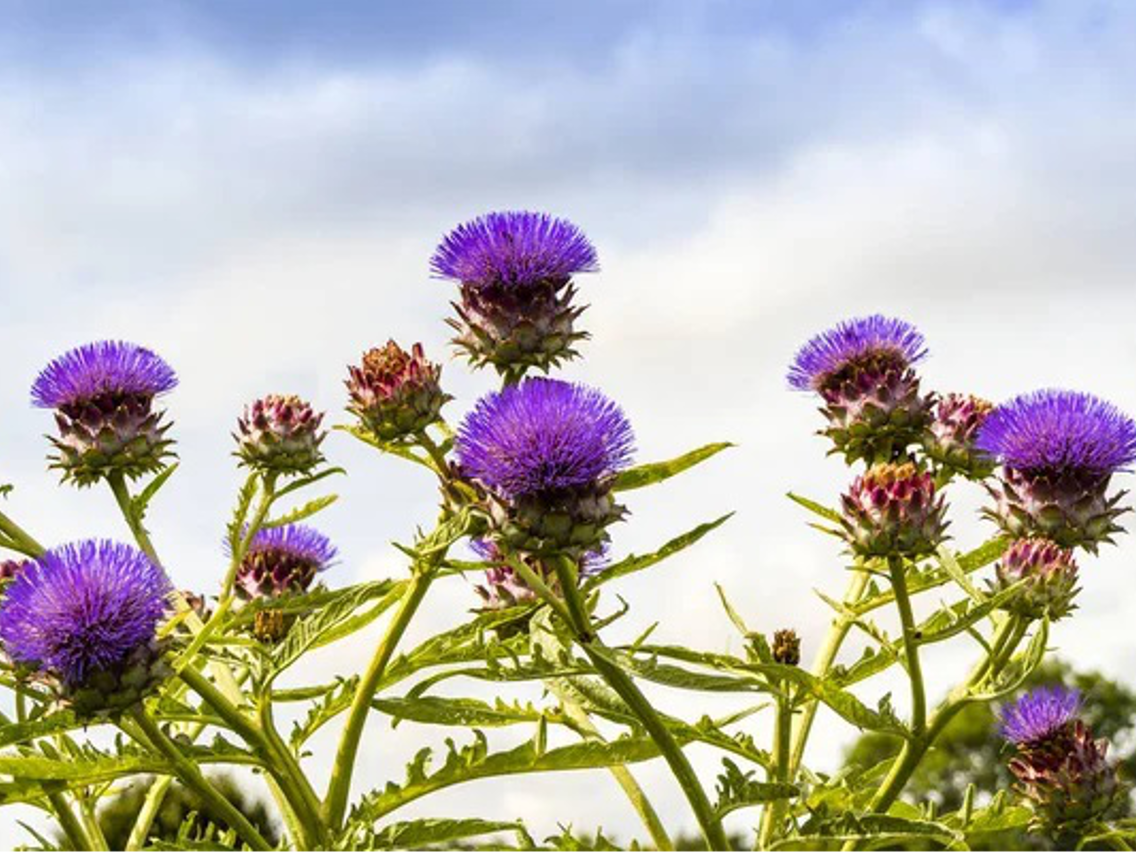Globe Artichoke - Cynara scolymus

Common Names: Globe Artichoke, Artichoke, French Artichoke, Green Artichoke, Cynara cardunculus var. scolymus, Cynara scolymus, Artischocke (German), Alcachofa (Spanish), Carciofo (Italian), Al-Kharshuf (Arabic), global, Latin
Latin Name: Cynara scolymus
Origin: Asia, Australia, Europe, South America, North America
Short Introduction
Globe Artichoke can be propagated vegetatively by offshoots or simply from seeds. Sow at the start of March in a cold frame, then transplant into pots. Once sufficiently grown, plant outdoors (or into a greenhouse) at 1m intervals at the beginning of May. This perennial should be cut back and covered with spruce branches for winter protection. Globe Artichoke is a heat-loving plant and does not tolerate frost below -10°C.
Detailed Description
Globe Artichoke is best known for supporting liver and gallbladder health, promoting pancreatic activity, and aiding liver detoxification.
Botanical Information
Globe Artichoke, scientifically known as Cynara scolymus, is a perennial plant reaching up to 1.5 meters in height. It belongs to the daisy family (Asteraceae). The artichoke bears pinkish flowers, but it is the immature flower buds that are consumed as a vegetable—enjoyed fresh, raw, or cooked.
Origin and Distribution
Globe Artichoke is a heat-loving plant, grown in warm regions much like grapevines. It likely originates from the Mediterranean. Today, it is widely cultivated across South and North America as well as Europe. Records of consuming its immature flowerheads can be traced back to Ancient Egypt and Rome.
Usage / Dosage
Traditionally, Globe Artichoke has been valued for its ability to stimulate bile production and flow, thanks largely to the bitter compound cynarin, which is most concentrated in the leaves. Artichoke is thus recommended for gallbladder conditions. It detoxifies the body and, by boosting liver function, assists with the excretion of toxins through urine. Its diuretic and detoxifying qualities make it useful in the management of gout, which involves uric acid accumulation. Artichoke also helps protect and strengthen the liver and lowers cholesterol and blood sugar levels, making it a beneficial support for people with diabetes. By reducing blood cholesterol, Artichoke supports heart and overall cardiovascular health. Artichoke is recommended for pancreatic disorders as it aids the production of digestive enzymes, improves metabolism, stimulates digestive secretions, and helps combat loss of appetite. Positive effects of Artichoke on heart function and blood pressure reduction are well documented. Since the sixteenth century, a wine decoction made from artichoke root (recommended by renowned physician Mattioli) has been used to reduce body odor, especially underarm odor.
Active Compounds
The main active compound responsible for the beneficial effects of Artichoke is cynarin. It stimulates bile secretion and reduces blood cholesterol. Thanks to its low calorie and fat content, it is suitable for dietary purposes. It is also a rich source of fiber (5.4g/100g). Fresh Artichoke is an excellent source of folic acid, essential for DNA synthesis—especially valuable during pregnancy. Artichoke is one of the plant sources of vitamin K and antioxidants like caffeic acid, ferulic acid, and silymarin. It also contains niacin, vitamin B6, thiamine, and pantothenic acid, as well as minerals such as potassium, copper, calcium, iron, manganese, and phosphorus. In smaller amounts, Artichoke includes flavonoids like beta-carotene, lutein, and zeaxanthin.
Traditional Dosage
Tea decoction: Pour 250ml boiling water over 2 teaspoons, let steep for 15 minutes. Drink one cup 3 times daily.
Wine decoction for reducing body odor: Briefly boil 80g fresh root with 1 liter of red wine. Allow to cool slowly and store in a cool place (cellar). Take 1 tablespoon 3 times daily for 15 days. After a two-week break, repeat the process once more.
Globe Artichoke is commonly eaten as a cooked vegetable.
